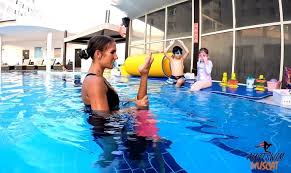
Infant aquatics programs provide an essential foundation for young children’s water safety and skill development. Introducing children to water at an early age helps them build confidence, develop basic swimming skills, and encourages a lifelong appreciation for safe aquatic activities. Here’s why infant aquatics are beneficial for children and parents alike.
1. Builds Water Confidence Early
One of the main goals of infant aquatics programs is to make children comfortable in the water. Familiarising infants and preschoolers with water through gentle, guided activities reduces fear and builds water confidence. When children feel safe in water from an early age, they’re better prepared to learn essential skills as they grow.
2. Promotes Physical Development
Water activities in infant aquatics programs support physical growth, helping young children improve coordination, balance, and muscle strength. Movements like kicking, reaching, and floating encourage motor skill development in a low-impact environment, fostering overall physical health.
3. Teaches Essential Safety Skills
Programs that focus on infant aquatics introduce foundational safety practices, such as learning to hold onto the pool wall and safely entering and exiting the water. These early skills are invaluable as children become more active in aquatic environments, helping them understand safe behaviours around water.
4. Enhances Parent-Child Bonding
Infant aquatics classes often involve parent participation, which strengthens the bond between parent and child. These shared experiences in a fun, supportive environment provide positive associations with water and build trust, allowing children to feel secure as they learn new skills.
5. Provides a Foundation for Lifelong Skills
Introducing swimming at an early age sets the stage for continued learning and development. Children who start in infant aquatics programs are more likely to pursue swimming and water activities as they grow older, developing essential skills that will serve them throughout their lives.
6. Fosters Social Interaction
In group-based infant aquatics programs, young children have the opportunity to interact with peers. This social exposure supports emotional growth, as infants learn to share, take turns, and engage with other children, all in a supervised and nurturing setting.
Conclusion
Infant aquatics programs are a valuable way to introduce young children to water safety, physical development, and social skills. By starting early, children build confidence and develop foundational skills that help them stay safe and enjoy the water as they grow.
